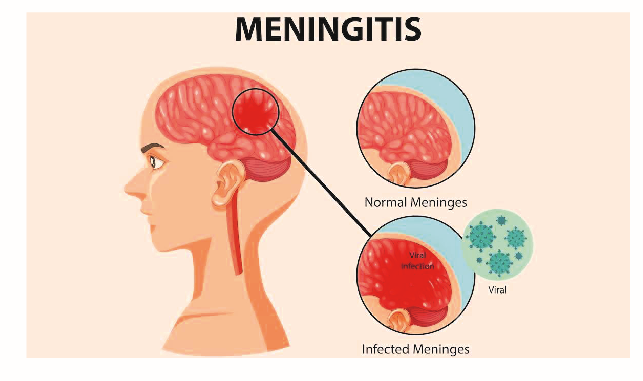As one of the 26 countries within the extensive region of sub-Saharan Africa known as the “Meningitis Belt” Nigeria has a long history of Cerebrospinal meningitis epidemic.
Cerebrospinal Meningitis (CSM) occurs when there is an acute inflammation of the covering of the brain and the spinal cord.
According to the Nigeria Centre for Disease Control (NCDC), CSM is an epidemic-prone disease with cases reported all year round in Nigeria. However, weather conditions like the dry season that comes with dust, winds, cold nights, and frequent upper respiratory tract infections increase the risk of infection, especially with crowding and poor ventilation.
The highest burden of CSM in Nigeria occurs in the “Meningitis Belt” which includes all 19 states in the Northern region, the Federal Capital Territory (FCT), and some southern states such as Bayelsa, Cross River, Delta, Ekiti, Ogun, Ondo, Osun), said NCDC.
In 2022/2023, Nigeria recorded 2765 suspected and 303 confirmed cases with 190 deaths across 140 Local Government Areas (LGAs) in 30 States including the FCT.
As at February 23, 2023, the director-general of NCDC, Dr. Jide Idris, said the centre was responding to meningitis outbreak, with 507 cases and 63 deaths in 19 states.
Stakeholders in the health sector have, therefore, called for increased surveillance and enlightenment towards curtailing the epidemic.
A public health expert, Dr. Gbenga Aliu, explained that meningitis is a dangerous and a life threatening disease that affects the thin layers of the tissue around the brain and spinal cord of an infected human person and it is caused by bacteria.
He added that Cerebrospinal meningitis is an epidemic prone disease that spreads from person to person through contact with discharges or droplets from nose and throat of an infected person, adding that it can also be transmitted through kissing, sneezing and coughing especially amongst people living in close quarters, hotels, refugee camp, barracks, public transportation and areas with poor ventilation or overcrowded places.
Gbenga noted that though, seasonal Meningitis outbreak usually affects the mainly Northern States that fall within the meningitis belt of the country, it is not impossible that outbreaks can occur in any part of the country, Lagos inclusive, in view of the phenomenal climatic change as well as the high human migration.
He explained that the disease usually presents with high body temperature, pain and stiffness of the neck, headache, vomiting, fear of light, restlessness and confusion stressed that death may occur if not promptly and properly managed.
The public health expert, therefore, emphasised the need for environmental hygiene as a preventive measure against the disease including hand washing with soap and water frequently; avoiding direct contact with the discharges from an infected person and covering of the mouth and nose when coughing and sneezing.
“It is strongly advised for people to avoid overcrowding in living quarters, provide cross ventilation in sleeping and work-rooms and other places where many people come together and get vaccinated with CSM vaccine when you are travelling to areas where Meningitis outbreaks have been reported”, he added.
He advised health workers to avoid close contact with suspected and probable cases of CSM based on the case definition distributed, and ensure proper disposal of respiratory and throats secretions of cases.
Meanwhile, Nigeria just receive the new MenFive vaccine against meningitis from the Gavi-funded global stockpile, w
Gavi, in a statement recently said that the doses will be used to respond to an on-going meningococcus C outbreak, targeting to vaccinate around a million children in six local government areas in Jigawa state: Babura, Birniwa, Gagarawa, Gumel, Maigatari, and Sule Tankarkar.
The statement noted that the MenFive vaccine, developed through a 13-year collaboration between PATH and Serum Institute of India, with support from the UK government’s Foreign, Commonwealth and Development Office, received the World Health Organisation (WHO) prequalification in July 2023.
It said the vaccine protects against the five main serogroups of meningococcal meningitis impacting Africa – meningococcal serogroups A, C, W, Y, and X. It is the only vaccIne that protects against serogroup X.
Gavi said this first shipment signals the start of its support for a multivalent meningococcal conjugate vaccine (MMCV) program, which will see the MenFive vaccine rolled out through outbreak response, routine immunisation, and catch-up campaigns in high-risk countries.
“Over the years, Gavi has worked with countries to support vaccination against meningitis A, reaching nearly 400 million children through campaigns and routine immunisation. These efforts have helped Africa defeat meningitis A, with no new cases detected since 2017. The addition of MenFive into health systems’ toolkit holds out the possibility that the other circulating serogroups could also one day be defeated’, said Gavi.
Commenting on this milestone, the director of High Impact Countries at Gavi, the Vaccine Alliance, Dr Tokunbo Oshin, said “With outbreaks of infectious diseases on the rise worldwide, new innovations such as MenFive are critical in helping us fight back.
“Thanks to vaccines, we have eliminated large and disruptive outbreaks of meningitis A in Africa: now we have a tool to respond to other meningococcal meningitis serogroups that still cause large outbreaks resulting in long-term disability and deaths.
“Gavi will be working closely with the Nigerian government as well as our partners such as UNICEF and WHO to support the response to this outbreak.”
Gavi, the Vaccine Alliance funds the global stockpiles of vaccines against cholera, Ebola, meningitis and yellow fever, and supports outbreak response campaigns in lower-income countries.











